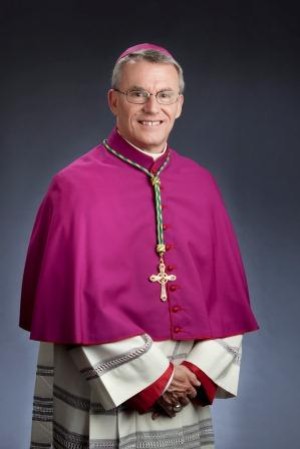Archbishop Costelloe on “same-sex marriage"
The Debate on “same-sex marriage"

Archbishop Timothy Costelloe SDB
Archbishop of Perth
As I write these few words the Australian Parliament has recently rejected, in both houses, proposals to legalize what is becoming commonly known as “same-sex marriage”. A similar proposal has also been defeated in the Tasmanian parliament. Many people will welcome these developments while others will be distressed or angered by them.
The Catholic Church is vitally interested in the question of “same-sex marriage” and her teachings in relation to it are very clear. It is perhaps timely that we remind ourselves of these teachings and try to understand them. They are part of the gift which we, as the Church, seek to offer to the society in which we live. It is not our role to impose our beliefs on others but we have the right and the duty to seek to make our voice heard.
Marriage is perhaps the oldest human institution we know of. It certainly pre-existed modern Australia and its parliamentary system and, indeed, pre-existed all parliaments. It is what we might call a natural institution. As such it seeks to provide the best environment in which a man and a woman, committing themselves to each other permanently and exclusively, establish a family in which their children can grow to maturity supported, loved and cared for by their mother and father. This permanence and exclusivity is a precious gift which a husband and wife give to each other and which they, as parents, also give to their children. It is the basis of family life.
This essential link between marriage and the family, and the right of children to be raised by their mother and father in a loving and stable family, are the basis for the state’s role in regulating marriage. If follows that any attempt to redefine marriage in such a way as to sever the link between the love of the partners in the marriage and the rights and needs of their children is a misuse of the state’s power. Our governments did not create the institution of marriage and they should not seek to dismantle it by altering its fundamental character. Rather, as many commentators have noted, the foundational role which families play in the well-being of a society underpins the responsibilities of governments to provide special protection and support to this institution. The fact that not all couples and all families are able to realize in themselves the high ideals of marriage means that this protection and support is even more vital. Families need all the help they can get.
It is for this reason that it is right to “discriminate” in favour of marriage and to acknowledge that this special union of a man and a woman who come together to form a family is unique. There are many other forms of human community and human relationships, but none are as fundamental for the well-being of our society as this one. None of them are a marriage.
Those who argue against the redefinition of marriage are often accused of unjust discrimination and the denial of people’s human rights. Sometimes they are accused of homophobia. The latter accusation is a sweeping generalization which by its very nature is itself unjust. The former accusation is premised on the notion that marriage should be open to everyone. But marriage, as opposed to other kinds of human relationships, is of its very nature the establishing of a union between a man and a woman for the purposes of their mutual love and support and for the raising of their children, should they have any, in a stable environment. The two dimensions are intimately linked. Marriage can only therefore be open to a man and a woman. Two men or two women who wish to establish a relationship can do so, but they cannot marry, because of what marriage is. “Same-sex marriage” does not extend marriage rights to a wider group of people. It dismantles marriage and creates something else – a relationship which has no essential link to the family which marriage exists to nurture and support. Calling this new reality a “marriage” cannot change that fact.
Because in our Catholic tradition we do not compartmentalize our lives, seeing some things as “religious” matters and others as purely secular matters, it follows that our deeply held convictions about the nature of marriage are based on the idea of the common good of society and at the same time on the teachings of our faith. God is the creator and sustainer of our lives and we are called to live in fidelity to his creative design. In doing so we believe that we are living in ways that will sustain and nurture healthy societies where people can flourish. What reason tells us is good for humanity is in profound harmony with God’s creative plan. Sexual difference and the sexual complementarity between a man and a woman, which are God’s gifts to us, are the basis for the creation of the family. They are the reason why we must respect, support and “discriminate” in favour of the unique institution of marriage.
In our Catholic tradition we are not so much against things as we are for things. We are for the family and for the rights of children to be raised by their mother and father. We are also for the rights of people to live free from unjust discrimination on the basis of race, religion, gender or sexual preference. As the Catechism of the Catholic Church puts it in relation to people of same sex attraction: “They must be accepted with respect, compassion, and sensitivity. Every sign of unjust discrimination in their regard should be avoided” (CCC 2358).
It is because we are for marriage, for the family and for the rights of children that we stand so firmly against any attempt to legislate to change the nature of marriage. We will continue to offer this vision of life to our society in the belief that it is a precious gift which we are called to share.
+Archbishop Timothy Costelloe SDB
Archbishop of Perth

